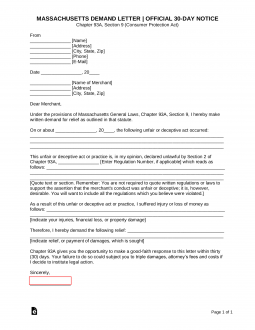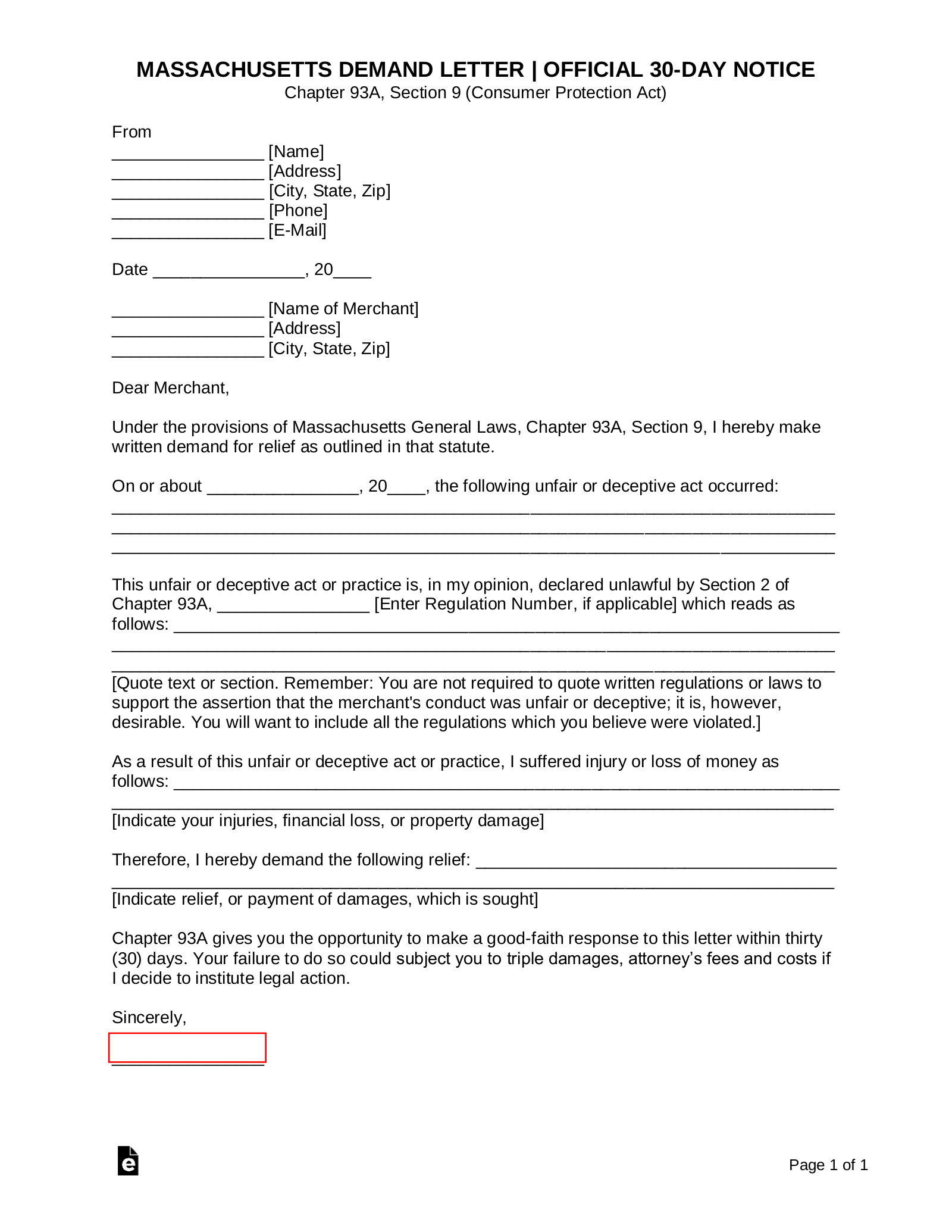Updated September 20, 2023
A Demand Letter for Chapter 93A is an official letter sent prior to filing a lawsuit against someone else, which describes the wrongful acts of the other party along with the “demands” requiring a response within thirty (30) days. The letter may be used for deceptive practices by a business such as bait-and-switch tactics, selling defective items, failure to refund, or any other issues covered by the Massachusetts Consumer Protection Act.
Laws – Chapter 93A: Regulation of Business Practices for Consumers Protection
Eviction Notice – If a tenant is behind on their rent, the landlord will be required to use the State-mandated housing forms.
Table of Contents |
Purpose of Law
The purpose of Chapter 93A is to provide consumers protection and steps to take against a business or individual who has committed wrongdoing. The law provides consumers with the ability to sue a business in court should a consumer feel they were the victim of deceptive practices.[1]
Prohibited Acts
Chapter 93A of the Massachusetts General Laws, also known as the “Consumer Protection Act”, are laws put in place that protects and defends consumers and prohibits a business or individual from taking part in deceptive, devious, or unfair acts or practices.[2]
Statute of Limitations
Four (4) years.[3]
Small Claims Court
The maximum amount is $7,000 that may be admitted to the Massachusetts Small Claims Court.[4]
Punitive Damages
If the merchant does not reimburse, settle, or respond to the filing party the defendant can be liable for up to triple (“treble”) damages and the cost of the other person’s attorney’s fees.[5]
How to File a Consumer Complaint (4 steps)
1. Gather Evidence

The first (1st) thing the consumer must do is gather all evidence of the deceit by providing receipts or proofs of payment by the consumer. If there were any damages caused, payment receipts that were used to rectify the situation must also be included. In addition, if there are any pictures or photos of the product or service that was provided and how it did not work as intended, this should be documented as well.
2. Write the 30-Day Demand Letter
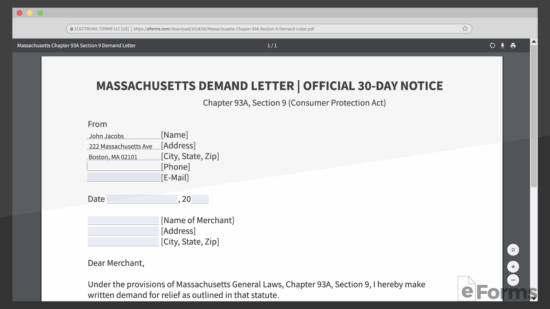
The Commonwealth of Massachusetts provides this sample, although this template (PDF, MS Word, ODT) can be used more appropriately when writing the demand letter. In accordance with the requirements of Massachusetts, the demand letter must consist of include:
- Full Name and Address of the Consumer;
- Full Description of the Unfair or Deceptive Practice;
- Clear Explanation of the Injury or Damages; and
- Demanded Relief, which commonly includes a dollar ($) amount.
Although not required, it should be stated that under Chapter 93A, Section 11, if the consumer is found for the judgment to be in their favor, the defendant can be found to pay treble (triple) damages and the cost of the consumer’s attorney fees.
3. Send the Demand Letter
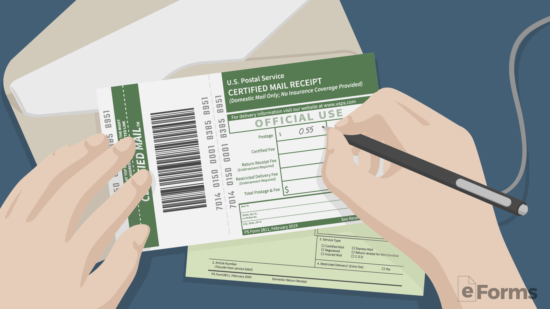
When sending the demand letter, it’s not required under law but is highly recommended to send via Certified Mail with return receipt. This will identify that the demand letter was successfully received by the Defendant and record their signature and date. The 30-day period starts when the defendant has received the notice (on the date located on the return receipt).
4. Legal Action

If there is no response in the 30-day period, the consumer has four (4) options:
- Small Claims Courts – If the amount being demanded is less than $7,000 the consumer can take their matter to Small Claims Court. This will require minimal fees and often the case is simple enough where the consumer can represent themselves.
- Housing Courts – If the matter was related to a housing issue, such as the landlord not returning the tenant’s security deposit, then the tenant must go through their local Housing Court.
- Mediation – Voluntary and requiring both parties’ consent. A mediator is typically someone who was a Judge or attorney practicing in the field of the issue with extensive knowledge of previous decisions. The Mediator will often be far less expensive for both parties and have a fair idea of a verdict before heading into any type of litigation.
- District or Superior Court – Should only be explored if the judgment being sought is for a significant amount. This will require legal representation and advice from a licensed attorney.
Sample Chapter 93A Demand Letter
May 1, 2018
John Jacobs
222 Massachusetts Ave
Boston, MA 02101
Boston Sea Mortgage Services
1240 Lincoln Street
Boston, MA 02103
Dear Boston Sea Mortgage Services,
The provisions dictated in Massachusetts General Laws of Consumer Protection, Chapter 93A, Section 9, grant me the right to make this demand, and I hereby make a written demand for the relief that is outlined in that act.
On the following date of April 2, 2018, what I deem deceptive and unfair business practices occurred, which are detailed below:
Landlord forced his way into my property without notice or court order without my knowledge.
According to Chapter 93A, Section 2 (Unfair Practices), a landlord is not allowed to force entry into the property without a court order.
Due to the unfair and deceptive practice, I have been subjected to, I have suffered the loss of property and money as described below:
Personal property was missing after illegal entry by landlord located at 222 Massachusetts Ave Boston, MA 02101.
This letter now serves as my request to obtain the following relief in the amount of $3,000.00. I am gracefully providing this business an opportunity to rectify and remediate the situation as requested above within 30 days of receipt of this letter. Should you fail to meet the aforementioned requirements, I will follow through with legal action as allowed by law.
I look forward to further discussion and hearing from you, please use the following number 617-555-5555 to get in direct contact with me to resolve this matter.
Regards,
John Jacobs
How to Write a Chapter 93A Demand Letter
Download: PDF, Microsoft Word (.docx), or Open Document Text (.odt)
1 – Save the Massachusetts Chapter 93 Demand As A Template
Use the downloadable links above to choose the PDF or word processing version of this letter
2 – Supply The Header Of This Demand Letter With Information
The majority of correspondence will require that the Sender and Recipient are identified outright at the top of the first page. This letter will follow this standard format. Start by filling in your own “Name,” “Address,” “City, State, Zip,” “Phone,” and “E-Mail” using the blank spaces directly under the word “From.” This section is meant to ensure the Recipient can contact you by mail, phone, or electronically at-will so make sure this information is documented properly. 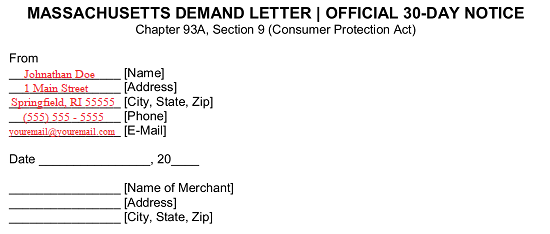
In many cases, the calendar date of this letter will be taken into account, especially if a court case ensues. To this end, identify the current calendar date using the two blank space attached to the “Date” label. 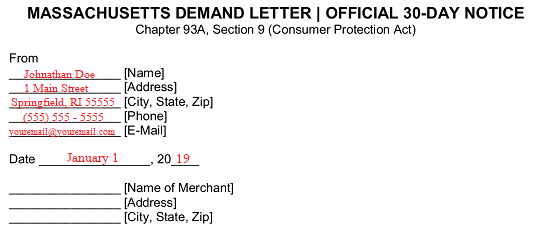
The Merchant will have to be addressed directly in this letter, but before doing so, you must enter the Merchant Recipient’s name on the blank line labeled “Name Of Merchant.” By entering this name here, you are solidifying who you hold responsible for receiving and answering this letter. 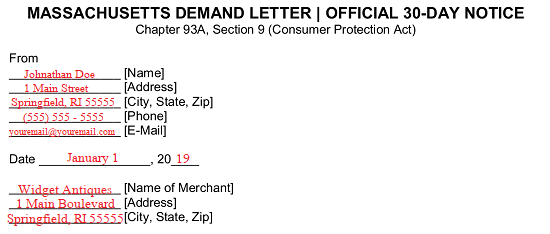
3 – State The Reason You Are Sending This Letter
The introduction of this letter will be handled by the wording used to construct it. It will apply to nearly every Merchant receiving such a notice. You must apply this letter to the individual situation it must concern by submitting some facts to the second paragraph This should being by making a record of the calendar date when the concerned incident occurred. Locate the phrase “On Or About…” for this task. If you do not know the exact date of the incident then attempt to make a good guess.  Now, the blank lines after the words “…Unfair Or Deceptive Act Occurred” will require an account of the incident, interaction, or transaction with the Recipient Merchant of this document that you believe falls under the corrective measures allowed under Massachusetts Chapter 93A. Be as specific as possible when providing this report. If you do not have enough room and wish to include more material then cite an attachment and make certain that attachment is presented to the Recipient with this letter. If you are working on screen with an editing program you can also simply insert more room.
Now, the blank lines after the words “…Unfair Or Deceptive Act Occurred” will require an account of the incident, interaction, or transaction with the Recipient Merchant of this document that you believe falls under the corrective measures allowed under Massachusetts Chapter 93A. Be as specific as possible when providing this report. If you do not have enough room and wish to include more material then cite an attachment and make certain that attachment is presented to the Recipient with this letter. If you are working on screen with an editing program you can also simply insert more room. 
4 – Cite Section 2 Of Chapter 93 Appropriately
The next paragraph will need to cite the part of Section 2 of Chapter 93A that can be applied to the situation you have defined. If there is a specific regulation that can be referenced, then lit is on the first blank space. If not, then you may leave it blank, but you must supply (preferably) a quote or explanation that makes it clear why this letter can be sent to the Merchant. Use the blank lines following the phrase “…Which Reads As Follows” to supply such material. 
5 – Define The Responsibilities Of The Recipient Entity
Now, on the blank lines in the statement beginning with “As A Result…” discuss the damages that occurred as a result of the actions of the Recipient. This can be as simple as the dollar amount you spent or lost but it must be logical and accurate.  The next paragraph will give you the opportunity to spell out what the intended consequences for the Recipient’s actions should be. There will be some space devoted to this after the word “…Relief.” Remember, this remedy should be one that is preferable to the Recipient then having to prepare a defense in court while still renumerating you for your losses. Thus, take some time out to make sure that you will hold the Recipient Merchant for actions and/or monies that are fitting to the offense.
The next paragraph will give you the opportunity to spell out what the intended consequences for the Recipient’s actions should be. There will be some space devoted to this after the word “…Relief.” Remember, this remedy should be one that is preferable to the Recipient then having to prepare a defense in court while still renumerating you for your losses. Thus, take some time out to make sure that you will hold the Recipient Merchant for actions and/or monies that are fitting to the offense. 
6- You Must Prove Your Intention By Signature
After you have supplied all the information required by this template, take a moment to review it. If you have any records, you may want to consult them for accuracy. When you are ready to send this document to the Merchant Recipient, sign the blank line at the bottom of the page then deliver it via certified mail. If certified mail is not available, you can use a courier service or regular mail. 

